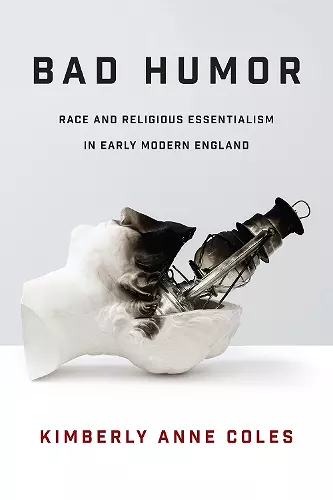Bad Humor
Race and Religious Essentialism in Early Modern England
Format:Hardback
Publisher:University of Pennsylvania Press
Published:19th Apr '22
Currently unavailable, and unfortunately no date known when it will be back

Race, in the early modern period, is a concept at the crossroads of a set of overlapping concerns of lineage, religion, and nation. Bad Humor charts how these concerns converged around a pseudoscientific system that confirmed the absolute difference between Protestants and Catholics and justified English colonial domination.
Race, in the early modern period, is a concept at the crossroads of a set of overlapping concerns of lineage, religion, and nation. In Bad Humor, Kimberly Anne Coles charts how these concerns converged around a pseudoscientific system that confirmed the absolute difference between Protestants and Catholics, guaranteed the noble quality of English blood, and justified English colonial domination.
Coles delineates the process whereby religious error, first resident in the body, becomes marked on the skin. Early modern medical theory bound together psyche and soma in mutual influence. By the end of the sixteenth century, there is a general acceptance that the soul's condition, as a consequence of religious belief or its absence, could be manifest in the humoral disposition of the physical body. The history that this book unfolds describes developments in natural philosophy in the early part of the sixteenth century that force a subsequent reconsideration of the interactions of body and soul and that bring medical theory and theological discourse into close, even inextricable, contact. With particular consideration to how these ideas are reflected in texts by Elizabeth Cary, John Donne, Ben Jonson, William Shakespeare, Edmund Spenser, Mary Wroth, and others, Coles reveals how science and religion meet nascent capitalism and colonial endeavor to create a taxonomy of Christians in Black and White.
"By analyzing how theology and natural philosophy of the period inform works of early modern English literature, [Bad Humor] traces the development of a racial logic that ultimately upholds and justifies English colonial rule by rendering impossible the religious conversion of Irish Catholics, Spanish Catholics, Africans and Indigenous people. Coles examines canonical works by John Donne, Ben Jonson, Edmund Spenser and Shakespeare alongside readings of Mary Wroth, Elizabeth Carey and Aphra Behn to document an emerging relationship between melancholy and religious error that assumes the heritability of (un)belief. Writing within a contemporary American context that has witnessed a rise in white Christian nationalism, Coles offers a timely exploration of how race and religion become intertwined." * Times Literary Supplement *
"This book offers a refreshing new approach to early modern critical race studies by investigating the correspondence of early modern science and religion in the construction of race and its manifestation in colonial practices. Specifically, Coles traces the process whereby wrong religion, caused by excess of melancholy corrupting the body and soul, becomes marked on the skin...By merging early modern science and religion in her study, Coles demonstrates how theories of the body and soul were manipulated to designate people of color and their offspring as non-Christian in order to justify colonial oppression...[A]n important contribution to early modern critical race studies through its alignment of race, religion, and science." * Renaissance Quarterly *
"Locating religion and race along a single axis, Kimberly Anne Coles measures the role of the connection between body and soul in the oppression and alienation of groups of people. Her argument gets at the foundations of race-making in a book that is thoroughly grounded in literary criticism, early modern race studies, religious history, early modern medical theory, and early American law." * Jonathan Burton, Whittier College *
"Bad Humor is a timely contribution to ongoing conversations about how religion informed early modern race-thinking. Arguing that earlier conceptions of hereditary bloodand rank enabled ‘Black melancholy’ to be tethered to irreligion, Coles shows that faith comes to be seen as less a feature of belief than an inheritable somatic condition. First articulated in relationship to Europeans and later to Black Africans, the idea that there exists a ‘complexion of the soul’ reveals early modern theology, natural philosophy, humoral medicine, and Protestant literature to be early contributors to white supremacy." * Valerie Traub, University of Michigan *
"Uncovering how humoral theory entwines with philosophical and theological discussions of the relationship between body and soul, Kimberly Anne Coles makes clear that English Protestants rendered belief and non-belief heritable, and that this understanding of the heritable nature of belief was used to justify colonialism and the enslavement of Africans. Bad Humor providesimportant new insight into the racialization of religion in early modern English literature." * Dennis Austin Britton, The University of British Columbia *
"In Bad Humor, Kimberly Anne Coles traces a logic whereby humoral imbalance—in particular, the excess of black bile supposedly registered in dark complexions—constitutes an essential moral inferiority that renders Christian conversion and civic affiliation impossible; those so cast outside the body politic are marked as legitimate objects of enslavement and genocide. Bad Humor compels us to attend to the enmeshment of science and religion in shaping early modern iterations of hierarchy and heredity attuned to the demands of emergent racial capitalism." * Melissa E. Sanchez, University of Pennsylvania *
ISBN: 9780812253733
Dimensions: unknown
Weight: unknown
248 pages